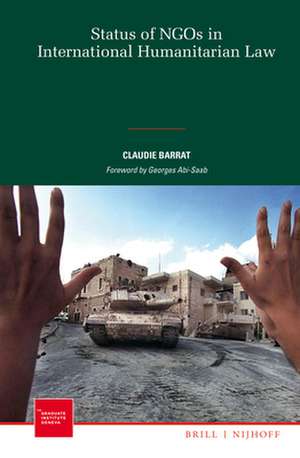Status of NGOs in International Humanitarian Law: Graduate Institute of International and Development Studies, cartea 14
Autor Claudie Barraten Limba Engleză Hardback – 24 iul 2014
Preț: 986.10 lei
Preț vechi: 1202.55 lei
-18% Nou
Puncte Express: 1479
Preț estimativ în valută:
188.72€ • 194.95$ • 157.06£
188.72€ • 194.95$ • 157.06£
Carte indisponibilă temporar
Doresc să fiu notificat când acest titlu va fi disponibil:
Se trimite...
Preluare comenzi: 021 569.72.76
Specificații
ISBN-13: 9789004269675
ISBN-10: 9004269673
Pagini: 384
Dimensiuni: 155 x 235 x 25 mm
Greutate: 0.75 kg
Editura: Brill
Colecția Brill | Nijhoff
Seria Graduate Institute of International and Development Studies
ISBN-10: 9004269673
Pagini: 384
Dimensiuni: 155 x 235 x 25 mm
Greutate: 0.75 kg
Editura: Brill
Colecția Brill | Nijhoff
Seria Graduate Institute of International and Development Studies
Cuprins
INTRODUCTION
1.DEFINITIONS AND SCOPE OF THE RESEARCH
1.1 NGOS1
1.2. IHL AS THE APPLICABLE LAW IN TIMES OF ARMED CONFLICTS
1.3. INTERNATIONAL AND NON-INTERNATIONAL ARMED CONFLICTS
1.4. DEFINITIONS AND METHODOLOGY TO DETERMINE CUSTOMARY LAW
2. THE RED CROSS AND RED CRESCENT MOVEMENT: A POSITION AFFIRMED IN INTERNATIONAL HUMANITARIAN LAW TREATIES
2.1. THE ICRC
2.2. THE FEDERATION OF RED CROSS AND RED CRESCENT SOCIETIES
2.3. THE NATIONAL SOCIETIES OF THE RED CROSS AND RED CRESCENT
3. THE REFERENCE TO 13 OTHER ORGANISATIONS IN IHL TREATIES: A BASIS FOR NGOS
3.1. VOLUNTEER/VOLUNTARY AID SOCIETIES
3.2. CIVIL DEFENCE ORGANISATIONS
3.3. CIVILIAN RELIEF/MEDICAL PERSONNEL
3.4. THE CIVILIAN RELIGIOUS PERSONNEL
3.5. SUBSTITUTES OF THE PROTECTING POWERS
3.6. IMPARTIAL HUMANITARIAN BODIES/ORGANISATIONS
3.7. ORGANISATIONS GIVING ASSISTANCE TO PRISONERS OF WARS
3.8. RELIEF SOCIETIES
3.9. INTERNATIONAL RELIGIOUS ORGANISATIONS
3.10. ORGANISATIONS DULY APPROVED BY THE PARTIES TO THE CONFLICT
3.11. SOCIAL OR COOPERATIVE ORGANISATIONS
3.12. ORGANISATIONS ENGAGED IN THE TASK OF REUNITING FAMILIES
3.13. ORGANISATIONS ASSISTING THE PROTECTED PERSONS
4. THE LEGAL PERSONALITY OF NGOS IN INTERNATIONAL HUMANITARIAN LAW: IS THAT THE QUESTION?
4.1 THE CONCEPT OF INTERNATIONAL LEGAL PERSONALITY
4.2 RECOGNITION OF EXISTING NGOS AS ORGANISATIONS CITED IN IHL TREATIES
4.3. THE CARROTS: CAN NGOS BENEFIT FROM DIRECT RIGHTS IN INTERNATIONAL HUMANITARIAN LAW?
4.4THE STICKS: WITH POWER COMES RESPONSIBILITY
5. CUSTOMARY RIGHTS OF NGOS IN INTERNATIONAL HUMANITARIAN LAW
5.1. A CUSTOMARY RIGHT TO OFFER SERVICES (RIGHT OF INITIATIVE)
5.2. A CUSTOMARY RIGHT TO HAVE ACCESS TO PROTECTED PERSONS
5.3. A CUSTOMARY RIGHT TO PROVIDE RELIEF TO PROTECTED PERSONS
5.4. A GENERAL CUSTOMARY RIGHT TO BE RESPECTED AND PROTECTED
6. CONCLUSION
BIBLIOGRAPHY
INDEX
1.DEFINITIONS AND SCOPE OF THE RESEARCH
1.1 NGOS1
1.2. IHL AS THE APPLICABLE LAW IN TIMES OF ARMED CONFLICTS
1.3. INTERNATIONAL AND NON-INTERNATIONAL ARMED CONFLICTS
1.4. DEFINITIONS AND METHODOLOGY TO DETERMINE CUSTOMARY LAW
2. THE RED CROSS AND RED CRESCENT MOVEMENT: A POSITION AFFIRMED IN INTERNATIONAL HUMANITARIAN LAW TREATIES
2.1. THE ICRC
2.2. THE FEDERATION OF RED CROSS AND RED CRESCENT SOCIETIES
2.3. THE NATIONAL SOCIETIES OF THE RED CROSS AND RED CRESCENT
3. THE REFERENCE TO 13 OTHER ORGANISATIONS IN IHL TREATIES: A BASIS FOR NGOS
3.1. VOLUNTEER/VOLUNTARY AID SOCIETIES
3.2. CIVIL DEFENCE ORGANISATIONS
3.3. CIVILIAN RELIEF/MEDICAL PERSONNEL
3.4. THE CIVILIAN RELIGIOUS PERSONNEL
3.5. SUBSTITUTES OF THE PROTECTING POWERS
3.6. IMPARTIAL HUMANITARIAN BODIES/ORGANISATIONS
3.7. ORGANISATIONS GIVING ASSISTANCE TO PRISONERS OF WARS
3.8. RELIEF SOCIETIES
3.9. INTERNATIONAL RELIGIOUS ORGANISATIONS
3.10. ORGANISATIONS DULY APPROVED BY THE PARTIES TO THE CONFLICT
3.11. SOCIAL OR COOPERATIVE ORGANISATIONS
3.12. ORGANISATIONS ENGAGED IN THE TASK OF REUNITING FAMILIES
3.13. ORGANISATIONS ASSISTING THE PROTECTED PERSONS
4. THE LEGAL PERSONALITY OF NGOS IN INTERNATIONAL HUMANITARIAN LAW: IS THAT THE QUESTION?
4.1 THE CONCEPT OF INTERNATIONAL LEGAL PERSONALITY
4.2 RECOGNITION OF EXISTING NGOS AS ORGANISATIONS CITED IN IHL TREATIES
4.3. THE CARROTS: CAN NGOS BENEFIT FROM DIRECT RIGHTS IN INTERNATIONAL HUMANITARIAN LAW?
4.4THE STICKS: WITH POWER COMES RESPONSIBILITY
5. CUSTOMARY RIGHTS OF NGOS IN INTERNATIONAL HUMANITARIAN LAW
5.1. A CUSTOMARY RIGHT TO OFFER SERVICES (RIGHT OF INITIATIVE)
5.2. A CUSTOMARY RIGHT TO HAVE ACCESS TO PROTECTED PERSONS
5.3. A CUSTOMARY RIGHT TO PROVIDE RELIEF TO PROTECTED PERSONS
5.4. A GENERAL CUSTOMARY RIGHT TO BE RESPECTED AND PROTECTED
6. CONCLUSION
BIBLIOGRAPHY
INDEX
Notă biografică
Claudie Barrat has a PhD in International Relations/Public International Law from the Graduate Institute of International and Development Studies (2009). She is currently working as a Policy Officer for the United Nations High Commissioner for Refugees in Geneva, Switzerland. Previously, she worked for United Nations organisations in Egypt, the Democratic Republic of Congo and the Palestinian Territory.












